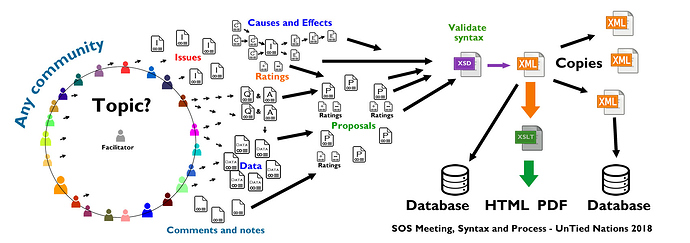Right Arm!  There’s a number of blockchain developers who came out to the hackathon and are keen to participate with their skills.
There’s a number of blockchain developers who came out to the hackathon and are keen to participate with their skills.
I’m also working separately with another two groups for the last few years, that Olivier is aware of. One is developing blockchain for natural resources and the other, for global collaboration. We can converge this hydrological restoration / hydrological restoration / agroforestry food production project. It definitely has to be an open source platform to mobilize a massive.collective action campaign.
You know the story of the 3 blind men and the elephant? The hydrological cycle, agroforestry, food production, permaculture, land restoration…these are all just different parts of the same elephant.
How much money do we need,Cindy? I think you miss the point of this whole hackathon exercise! Maybe I haven’t articulated clearly enough the radical idea I am proposing with the hackathon…We are trying to demonstrate that we can do many things we though were impossible without funding. This requires some understanding of the massive potential that lay in massive networks. It’ requires enough of us recognize this potential. If not enough people recognize the potential, it won’t happen.
I’m going to upload my presentation here that I made for Open Hack Sweden yesterday. That will explain FULLY the vision. If you don’t understand after going through the powerpoint, I can present to you and explain. Quite simply though, it is the idea that by having massive online collaboration, we can bypass a large amount of financial capital and go straight to human capital. It’s the open source methodology, but framed slightly differently. The BIGGEST misconception of Open Source is that it’s “free”. But that’s because we keep comparing it the dominant capitalist narrative in which money is the de facto standard of value. Open Source is just another way to achieve the same result, but without financial capital. If enough people believe in an idea, they will contribute their human capital.
By the way, BIG thanks to David @DavidOH, for the opportunity to address all your Swedish colleagues at the university yesterday! Actually this is rev 3 of the prez, not prez 2 that I presented. I added one more slide…slide 36 to show how Dr. Roberto Valenti’s “Karma” can be used to compensate people using blockchain, as well as Envienta’s already existing platform on digital collaboration network…the user interface, of which @Gabor has already mostly finished. Everyone has valuable bits and pieces to the puzzle, but nobody has the entire puzzle pieces assembled into a coherent framework that can gamify saving humanity via a citizen-centric MOOCC approach.
SRG’s vision is to provide an open solidarity framework for innovators all over the world…to create a global governance structure along with a solidarity network of innovation / peer production hubs around the planet.
See the presentation I presented to Open Hack below to understand how we can create MOOCC (Massive Open Online Citizen Collaboration) platform. We are pushing the limits of Open Source. Try to imagine what Massive really means…there can be thousands or millions of highly skilled people contributing. That’s what Massive means. Once you reach that level of Open Source, you will hit a nonlinearity that will change the entire economic system…turning it from the competitive MEconomy to the collaborative WEconomy.
We have to create a new platform so that ALL solidarity partners coming into it are equal. The only way I can see this happening democratically is if we all vote on making a new neutral brand whose name convey s the global transformative intent so that no one existing brand can dominate.
If you look at the presentation, this is a evidence-based, ecologically based platform that can gamify saving humanity…but in a practical, collective action campaign involving every local action contributing in a measurable way.
openhack-srg-rev3.pptx (4.5 MB)
 I don’t know if a “silver bullet platform” is feasible, but rather a collection of tools.
I don’t know if a “silver bullet platform” is feasible, but rather a collection of tools.  I have given a LOT of thought to the syntax (I have a background in both linguistics and IT data etc - which is handy!) though I am still playing with structure. There is an example file on
I have given a LOT of thought to the syntax (I have a background in both linguistics and IT data etc - which is handy!) though I am still playing with structure. There is an example file on 
 I will invite her over here, she will find this project amazing and she’s a great resource.
I will invite her over here, she will find this project amazing and she’s a great resource. There’s a number of blockchain developers who came out to the hackathon and are keen to participate with their skills.
There’s a number of blockchain developers who came out to the hackathon and are keen to participate with their skills.